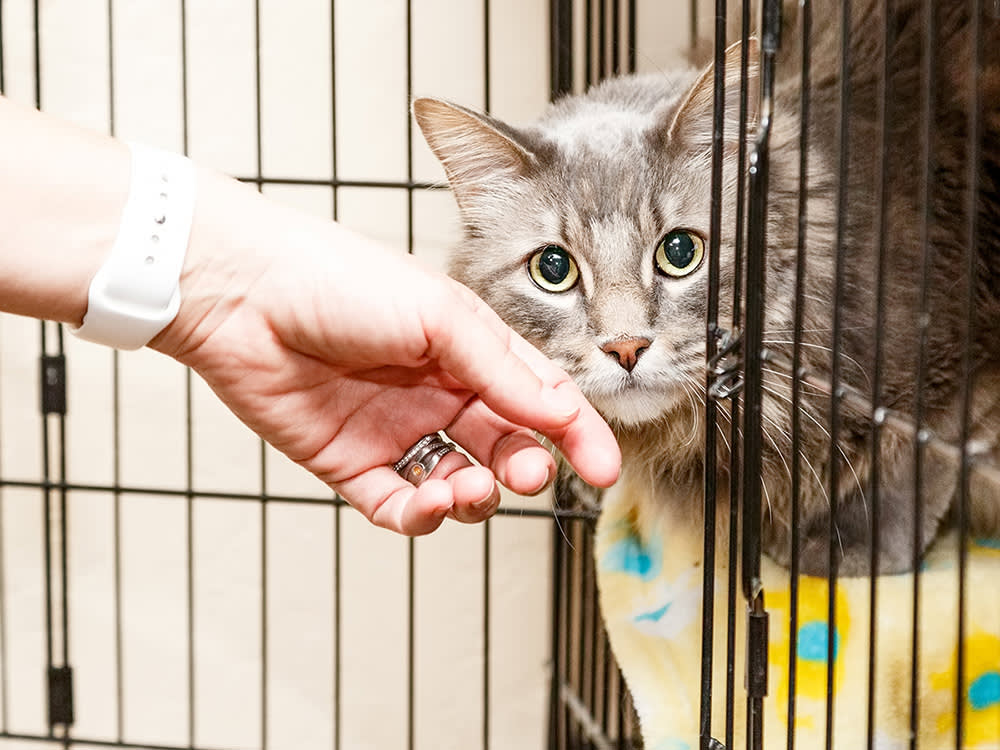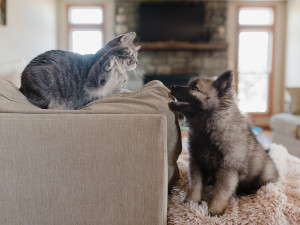10 Questions to Ask a Rescue Centre About an Adoptable Cat
From medical history to adoption fees to litter preferences, here’s everything you need to know

Share Article
Caring for cats is a breeze, right? You keep their food dishes full, their litter boxes clean and let them decide whether to snuggle or (more likely) not. While they may not require bathing or daily walks like dogs, cats still have distinct personalities and needs. That means the cute Calico in one enclosure at the rescue centre might need a very different living situation than their Maine Coon neighbour.
“Cats have so many different nuances to their behaviour,” says Caitlin Phillips, people and operations manager at Animal Rescue League of Boston. “To find the right fit for your lifestyle, ask lots of questions.” If you’re wondering where to get started, you aren’t alone. Here are 10 questions to ask at a rescue centre before adopting a cat, so you can feel confident that you’ve left no stone unturned.

littleKin™ is Kinship’s home just for puppy and kitten parents. Bop over to check out expert advice, new pet tools, and special deals—all curated for your newest family member.
opens in a new tab1. What is the cat’s medical history?
In addition to inquiring about their vaccinations and spay/neuter status, ask whether the shelter has tested for diseases such as feline leukaemiaopens in a new tab (FELV) or feline immunodeficiency virus (FIV), which can impact the type of care they need and their ideal living situations. Knowing what tests and procedures the cat has already had – and what still needs to be done – can help you plan and budget for their care, adds Dr Kate F Hurley, director of the shelter medicine programme at University of California Davis and co-founder of the Million Cat Challenge.
2. Does the cat have a history of litter box issues?
Going outside the litter box is one of the top reasons cats are surrendered to shelters. Poor litter box behaviouropens in a new tab could be a sign of medical conditions such as urinary tract infections or kidney stones, or an aversion to a specific type of litter or litter box location. Unaltered cats may also exhibit poor bathroom behaviour. “Intact male cats have a pungent smelling urine and may be more likely to spray this scent in your home,” says Caitlin. Knowing that an adoptable cat may need treatment or some trial and error with different litter and litter box locations is an important factor in deciding whether they’re the right fit for your home.
3. How old is the cat?
Kittens have boundless energy and endless curiosity, which is why it requires a lot of engagement and supervision to keep them happy and out of trouble. Senior catsopens in a new tab may be content to sleep in a sunny spot, but may need a special diet or additional vet care to keep them healthy in their advanced age. Asking this question will help you find an adoptable cat who is most suited to your lifestyle.
4. Has the cat lived with other animals?
Some cats are surrendered to the shelter for not getting along with other cats in the home. These are not the best adoption candidates for families with one (or more) cats at home, while cats that are used to having feline friends might benefit from being adopted into homes with other cats. Rescue centres may also be able to ‘dog test’ adoptable cats to determine whether the cat would be comfortable living in a home with a respectful canine companion.
5. Is the cat used to being indoors or outdoors (or both)?
“This question can be very important to picking the right cat for your home,” says Caitlin. A cat who is used to being outdoors might struggle to adjust to being confined in a flat or house, which could lead to escape attempts, marking, or other nuisance behaviours. Providing enrichment can help but Caitlin warns that it can be difficult for cats to adjust to extreme changes to their environment. Equally, cats who are used to being indoors with 24/7 access to warmth and a king-sized bed can’t be expected to adjust to life in the garden.
6. How would you describe their personality?
It can be hard to assess whether a cat is snuggly or standoffish when you visit them at a rescue centre, but staff often know which cats like to be stroked and which would rather be left alone. “Sometimes cats show really different behaviour before the centre opens,” says Dr Hurley. Adopting from a foster-based rescue can also give you insights into how a cat acts in a home.
7. How much grooming does the cat need?
Shorthaired cats may be able to take care of their own grooming needs, but Dr Hurley notes the long hair breeds such as Persian and Angora cats may require regular brushing or professional grooming to help keep their tresses tamed.
8. What is the adoption fee?
While Dr Hurley notes “there is no such thing as a free cat”, shelters sometimes run reduced or fee-waived adoptions to help cats get out into their forever homes. Don’t forget to ask what the adoption fee includes. Shelters may provide spay/neuter, initial deworming, vaccinations, and a microchip as part of the adoption fee, while others require adopters to cover those costs on their own.
9. What are you feeding the cat?
Cats are very food sensitive; switch up their meals and it can cause serious stomach upset, according to Dr Hurley. Before bringing a cat home, ask the staff or foster home what brand and type of food they have been feeding them, and start your new family member on the same food at home. If you want to transition to a new brand or switch from dry food to wet food (or wet food to dry), doing it gradually can help your cat adapt without tummy troubles.
10. What do I do if it doesn’t work out?
Shelters and rescue groups work tirelessly to make ideal matches, but sometimes adoptions don’t work. Dr Hurley believes it’s important to understand the policies and what you should do if the cat you bring home turns out to be a poor fit. “It’s an important relationship… and sometimes, in a shelter, you can’t tell if it’s the right match,” says Dr Hurley. “There’s the right cat for every person and the right home for every cat.”

Jodi Helmer
Jodi Helmer is a North Carolina-based freelance writer who shares her home with an embarrassing number of rescue dogs and relies on four feral cats to patrol the barn. When she isn’t refilling food and water dishes, Jodi writes about animals for Scientific American, Sierra, WebMD, AKC Family Dog, Living the Country Life, and Out Here.
Related articles
- opens in a new tab
Cats vs Dogs: Exploring Feline Intelligence and Canine IQ
A common (if not silly) question with a complicated answer
![Happy stylish latino queer person looking comfortable on porch steps with gray cat.]() opens in a new tab
opens in a new tabCats Lifespan: How Long Do Cats Live?
They are the absolute light of your life. Here’s how you can help them live as close to forever as possible
![A woman with dark curly hair lifting a box with a plant in a pot balanced on top to another area in the home]() opens in a new tab
opens in a new tabHow to Prepare For an Adoption Home Visit
7 tips for acing your inspection and bringing your new pup home


